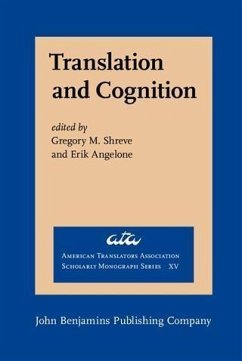Translation and Cognition assesses the state of the art in cognitive translation and interpreting studies by examining three important trends: methodological innovation, the evolution of research design, and the continuing integration of translation process research results with the core findings of the cognitive sciences. Several of the volume's essays focus on fruitful new process research methods, such as eye tracking and keystroke logging that have arisen to supplement the use of think-aloud protocols. Another set of contributions investigates how some central theories, concepts, and methods from our sister disciplines of psycholinguistics, cognitive psychology, and neuroscience can inform our understanding of translation processes and their development in novices and experts. Yet another set of essays argues that methodological innovation and integration with the cognitive sciences can lead to more robust research designs and theoretical frameworks to explain the intricacies of cognitive processing during translation and interpreting. Thus, this timely volume actively demonstrates that a new theoretical and methodological consensus in cognitive translation studies is emerging, promising to greatly improve the quality, verifiability, and generalizability of translation process research.
Dieser Download kann aus rechtlichen Gründen nur mit Rechnungsadresse in A, B, BG, CY, CZ, D, DK, EW, E, FIN, F, GR, HR, H, IRL, I, LT, L, LR, M, NL, PL, P, R, S, SLO, SK ausgeliefert werden.
Hinweis: Dieser Artikel kann nur an eine deutsche Lieferadresse ausgeliefert werden.


